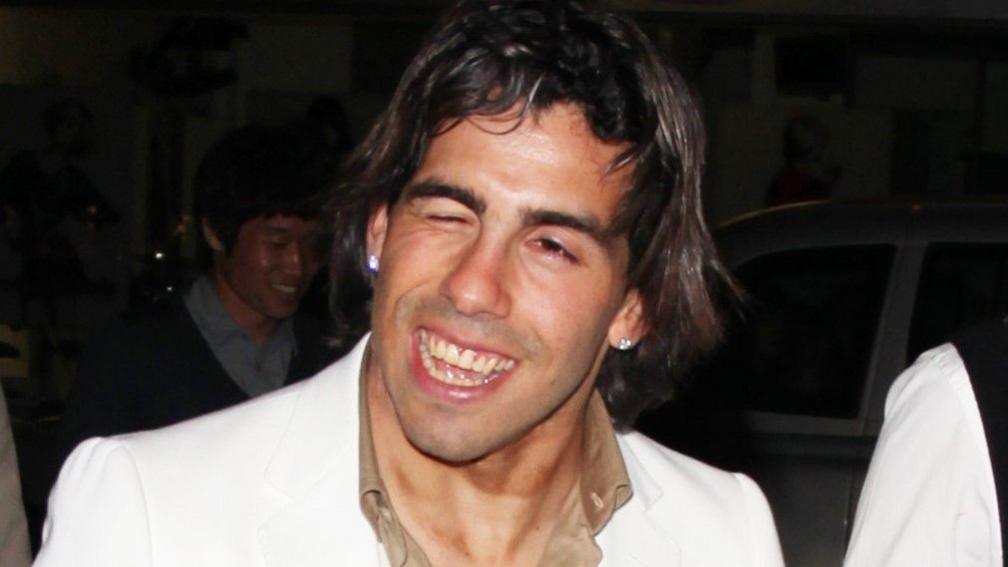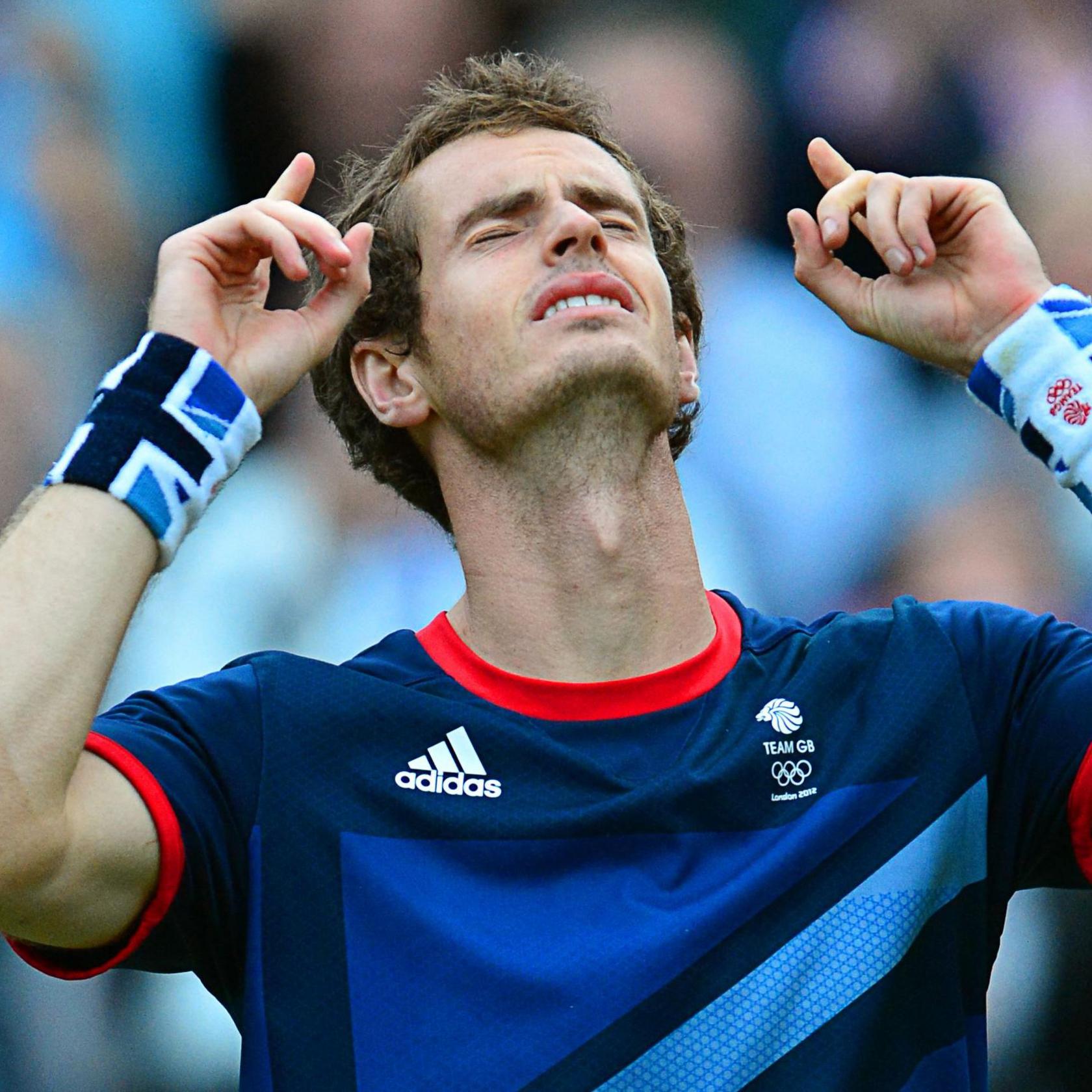
Inscribed above the doors that lead to Wimbledon's Centre Court is a famous line from Rudyard Kipling's poem, If.
"If you can meet with Triumph and Disaster and treat those two impostors just the same," it reads.
It is there to remind the world's best and their challengers that you are defined by more than the scoreboard.
No-one knows that as well as Andy Murray.
The grass courts at SW19 were the scene of a four-week period in 2012 that changed the way a swathe of the British public thought of Murray. Beaten in the Wimbledon final, he regrouped, returned and won Olympic gold on the same court in front of packed stands.
He swore. He cried. He celebrated. He felt the love.
This is the story of the 28 days that confirmed Murray as a national treasure.
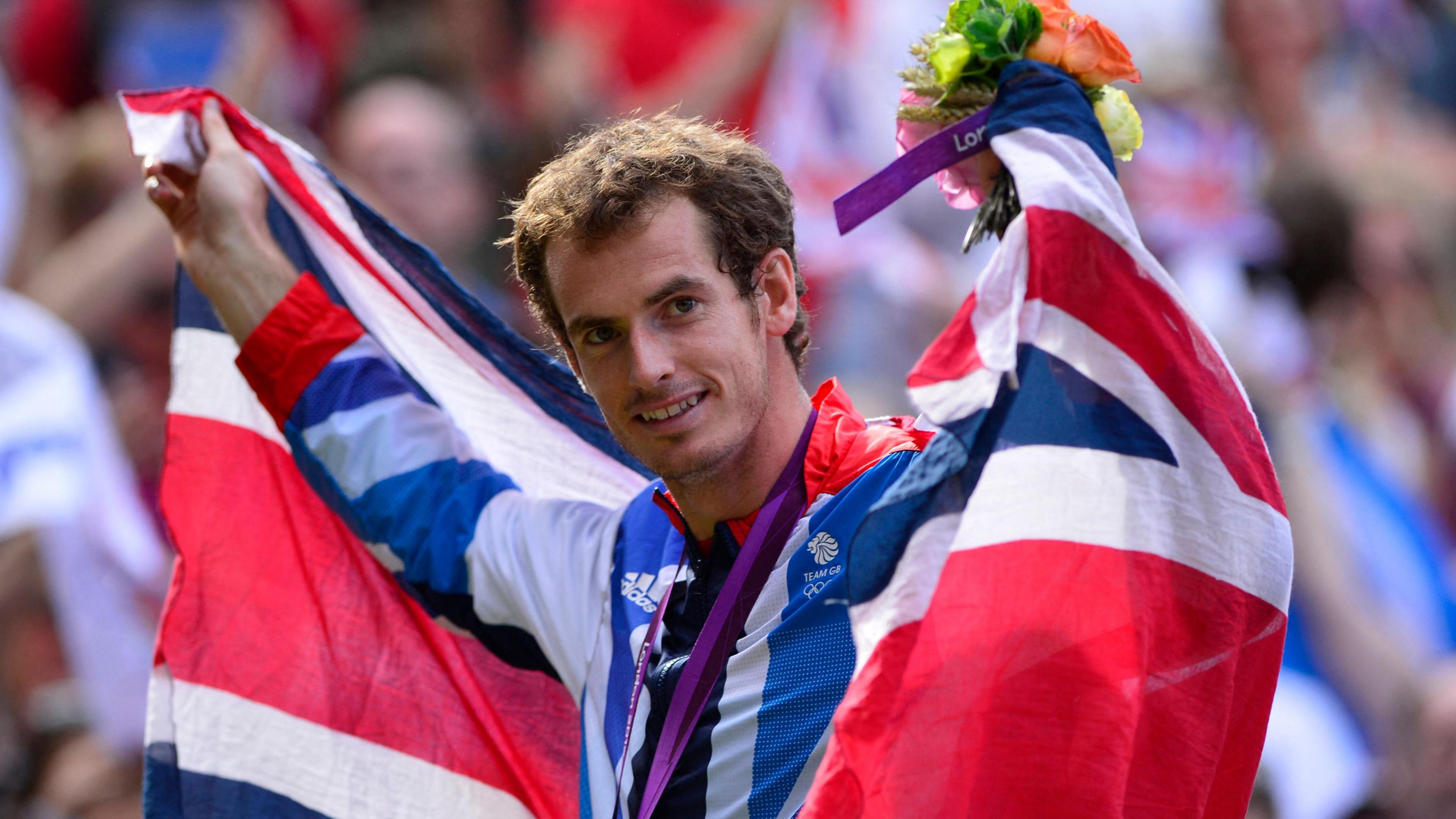
Murray watched Jessica Ennis-Hill, Mo Farah and Greg Rutherford win athletics golds the night before his London 2012 final against Roger Federer
Before he was Sir Andrew Murray OBE, world number one, three-time Grand Slam champion, one of the nation's greatest-ever athletes... he was, to one woman at least, something altogether less celebratory.
In 2006, the football World Cup was taking place at the same time as Wimbledon. A 19-year-old Murray, himself once a promising youth footballer, joked in an interview that he would support "whoever England were playing against".
It went down like a lead balloon. He was abused in the comments of a blog he wrote on his website and even his wristbands, decorated with the Scottish saltire, attracted scrutiny.
Murray had become a lightning rod, attracting ire in an edgy Anglo-Scottish atmosphere. The previous month, the then Scottish First Minister had been criticised for saying he would not be supporting England.
But the reaction to Murray's joke was on a far larger scale.
In the aftermath, Murray, playing only his second Wimbledon, walked past a spectator on the way to his match. He overheard her telling a friend, in expletive-laden and anti-Scottish language, that she had just spotted him.
"I was like, What? I was 19. This is my home tournament. Why is this happening?" Murray remembered in a 2017 interview., external
"I was still a kid and I was getting things sent to my locker saying things like: 'I hope you lose every tennis match for the rest of your life.'"
By the time 2012 rolled around, Murray had already broken new ground.
He had reached the US Open final in 2008, becoming the first British man to make a major final since Greg Rusedski in New York 11 years earlier.
Two further Slam final appearances followed - the Australian Open in 2010 and 2011 - but Britain was still searching for a first male major singles champion since Fred Perry in 1936.
But the ambivalence of some of the general public remained.
As the Twitter joke went, Murray was British when he won and Scottish when he lost.
It sometimes seemed there was something inordinate about Murray - his outspokenness was loved to a certain point, his on-court anger amusing when he was winning but derided when he was losing.
At this point, Murray was a nascent member of the Big Four. Roger Federer was transcendent, described as a 'god', especially at Wimbledon. Rafael Nadal had the grit, the determination, the never-say-die attitude.
Novak Djokovic, another relative newcomer trying to upset their duopoly, defied belief, limbs bending every which way, equipped with an endurance level and mental strength few can match.
But Murray? Murray was the most human. A man who sometimes looked as if he actively hated the sport of tennis. No-one could ever accuse Murray of hiding his emotions. And that rubbed up some the wrong way.
He was accused of being whingey, of being anti-English, of being boring, when really he was doing what we all do - getting frustrated about the job and attempting to have a laugh along with it.
"I think it's very difficult for any young player who is thrust into the spotlight to get to grips or feel comfortable with facing and understanding the media," said his mum Judy, speaking on Andy Murray: Will to Win, a recent BBC Sport documentary.
"One of the things in tennis is that players have to face the media after every match whether they win or lose. Of course, it's a lot easier to face the media when you're winning.
"As an 18-year-old he'd had a little bit of media training but nothing really prepares you for suddenly being in front of a room of about 300 people.
"I think his reaction to anything is to be truthful and say what you're thinking. In years to come, you will become much more practised."
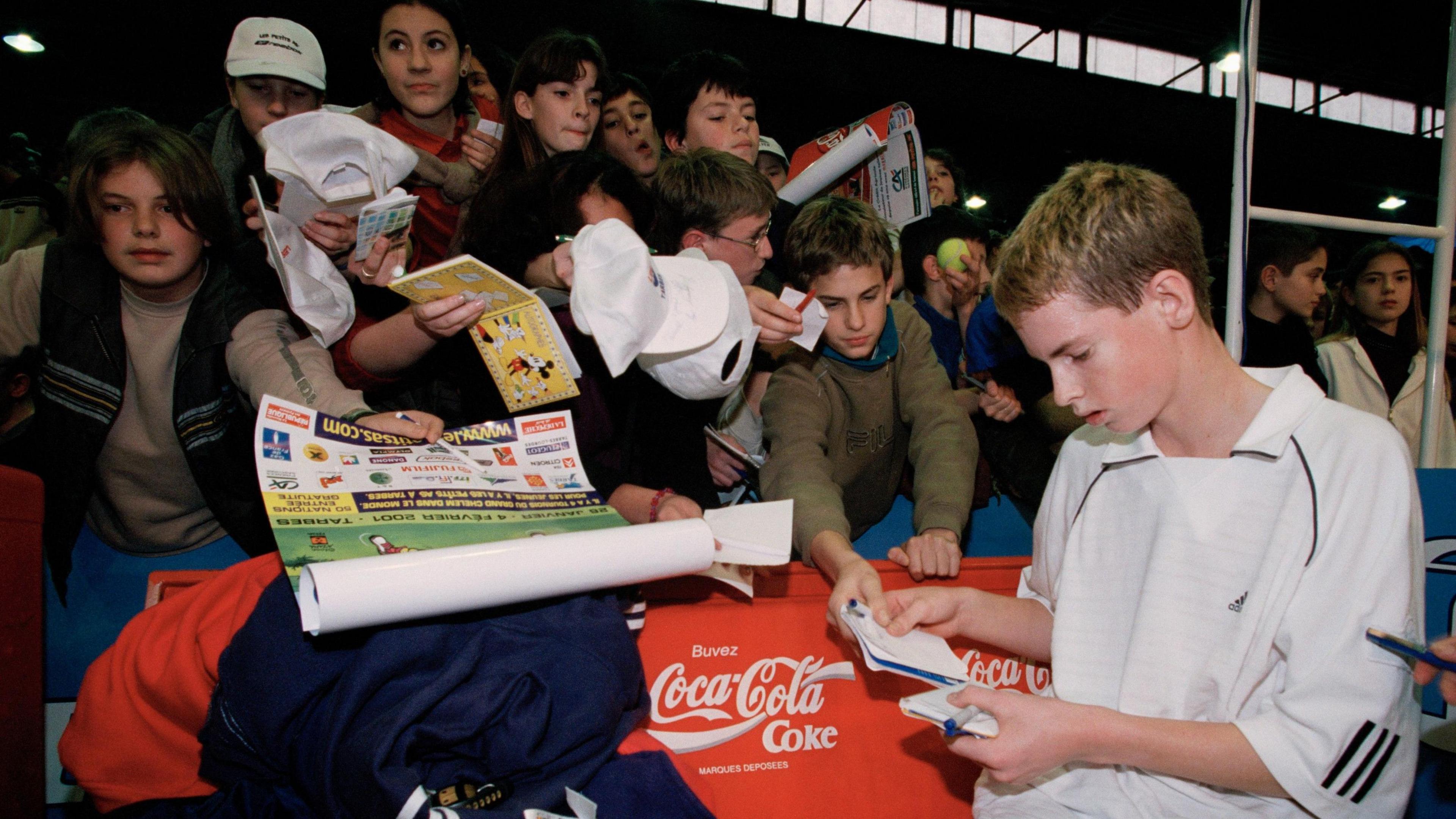
Murray, seen here aged 13 at a high-profile junior tournament in Tarbes, has long been accustomed to the attention, hype and scrutiny of elite tennis life
And so to Wimbledon. The crowds gathered on Henman Hill - in the days when shouts of "come on, Tim!" still raised a chuckle on Centre Court - to watch the human take on the god.
It was Murray's first Wimbledon final, Federer's eighth. The newspapers declared Murray a hero, talking about his date with destiny. But as one paper asked on their front page: "Can he finish the job?"
John McEnroe, commentating on BBC TV, pointed out the quandary for the crowd. "I'm interested to see what will happen if and when, as we expect, the crowd gets behind Murray. He should be reminding them that I have no Wimbledon wins and Federer has six - but everyone loves Roger."
The tennis was electric. Murray was excellent. Federer was better. But it was the speech that followed, made as Murray walked up to accept the runner-up trophy, that lingers in people's minds.
Murray puffed out his cheeks as he tried to speak, before he was drowned out by the noise from the crowd. He smiled, shook his head and exhaled before, with a voice on the verge of breaking, saying: "I'm going to try this. And it isn't going to be easy..."
Even now, it's hard to watch. His voice cracked throughout. There's the dry humour - Federer "is not bad for a 30-year-old" - and the heartfelt thanks to his team. The acknowledgement that "I'm getting closer", both honest and cruel to think about. But it's the bit where he thanks the crowd, the raw emotion, that really cuts through.
He was held up by three separate ovations before departing to another. By the end, his mother, wife-to-be and plenty of those in the stands were in tears.
"I felt like I was playing for the nation," Murray said later. "And I couldn't quite do it.”
It was pure emotion. The man who had been accused of being cold, grumpy, anti-English, was standing at Wimbledon - that most quintessentially English of places - in tears, telling the crowd how much their support means to him.
"To watch him communicate how much that moment meant to him made me want to root for him more, no question," Henman said in a BBC retrospective in 2020.
"I find it slightly sad that it took him to cry in his acceptance speech for people to suddenly take a step back and go: 'Wow, he has got a heart. He is a sensitive soul.'"
Wimbledon 2012: Andy Murray's tears in defeat
The defeat certainly cut deep.
"I was unbelievably upset, disappointed and all of those things," says Murray looking back at that defeat by Federer.
"I said to myself after that I may never win a Grand Slam. I was working as hard as I could work and getting close, but it was never quite enough.
"But the Olympics was coming up and I had to make the most of it. I got back on the practice court and ended up having probably the most important week of my tennis career."
Four weeks to the day after the Wimbledon final, at the same venue, Murray was striding out behind Federer once again.
This time, it was the Olympics. The weather had gone from drizzly to baking hot, the roof wide open to let the sunlight flow down on to Centre Court.
And, with the All England Club's all-white dress code out the window and Britain gripped by the Games, the atmosphere was bubbling.
WATCH: Andy Murray: Will to Win
- Attribution
LISTEN: Sporting Giants - Andy Murray
- Attribution
Murray to retire after Paris Olympics
- Published23 July 2024
'Compelling on and off court' - a decade on tour with Murray
- Published1 August 2024
"That day was the first time I really saw the crowd really behind him," reflects McEnroe.
Singles gold was the one thing missing from Federer's packed CV, and given the surface and venue, he was the favourite.
And yet, in just under two hours, Murray overwhelmed him in straight sets to claim what he later described as "the biggest win of my life".
In front of a rapturous crowd, Murray became the first British man to win Olympic singles gold since Josiah Ritchie in 1908.
The next day, Murray shared space on the back pages with Usain Bolt and Jessica Ennis-Hill. He had watched the athletics the night before his final to inspire him. He later wrote in his autobiography that "as an individual sportsman, I have certainly never experienced anything like it".
"I think that was the making of him really," says Jamie Murray, Andy's older brother and seven-time Grand Slam doubles champion.
That year was undoubtedly a turning point. Murray went on to win his first Grand Slam at the US Open two months after the Olympics, and ended the year as the world number three. But something had also shifted for the public.
As one fan told the Guardian, external after his Olympic triumph: "I didn't used to like him - he was no Tim. I started liking him when he showed some emotion after losing to Federer in the Wimbledon final. You can see how much it means to him."
Murray himself reflected after his US Open win that "it's a shame that it took me crying at Wimbledon to maybe change that a little bit, but the support I've had over the last few months has been unbelievable.''
"In 2012, after he won the US Open, there was an opportunity to come back to Dunblane and do an open-top bus tour," Judy remembered.
"Andy is really quite shy and under the radar, he was perhaps a little unsure about that and whether anybody would turn up or be interested.
"But the crowds that were trying to come into the town that day... The high street in Dunblane is a one-way street, very narrow, and we got off on the dual carriageway and walked down into the high street.
"The turnout of the crowds, it was canny."
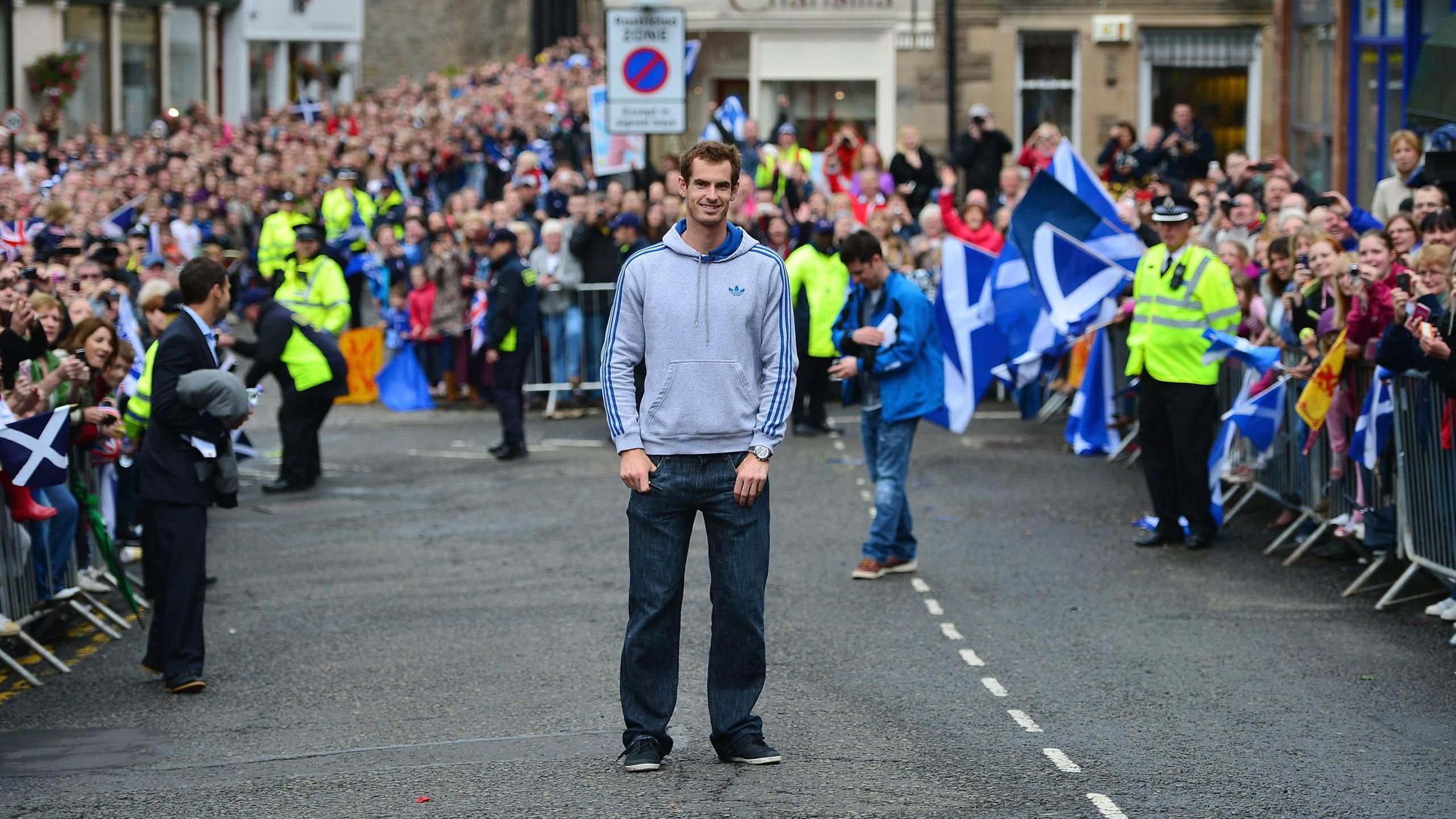
Murray and his wife Kim have reopened a hotel in his hometown of Dunblane, partly inspired by a desire to give back to the local community
It is now 12 years since that summer. Murray has played in his final Wimbledon and retired from tennis following his final Olympics.
In that time, he has won three majors, become world number one, had a metal hip inserted and become a feminist icon. He is given ovations every time he walks out at Wimbledon.
There are still countless tweets about Murray doing it again, the rollercoaster ride he takes us on as he scraps and rages against the dying light.
Murray is a bone-fide national treasure, and those four weeks at Wimbledon played no small part in that.
This feature was initially published on 27 June 2024
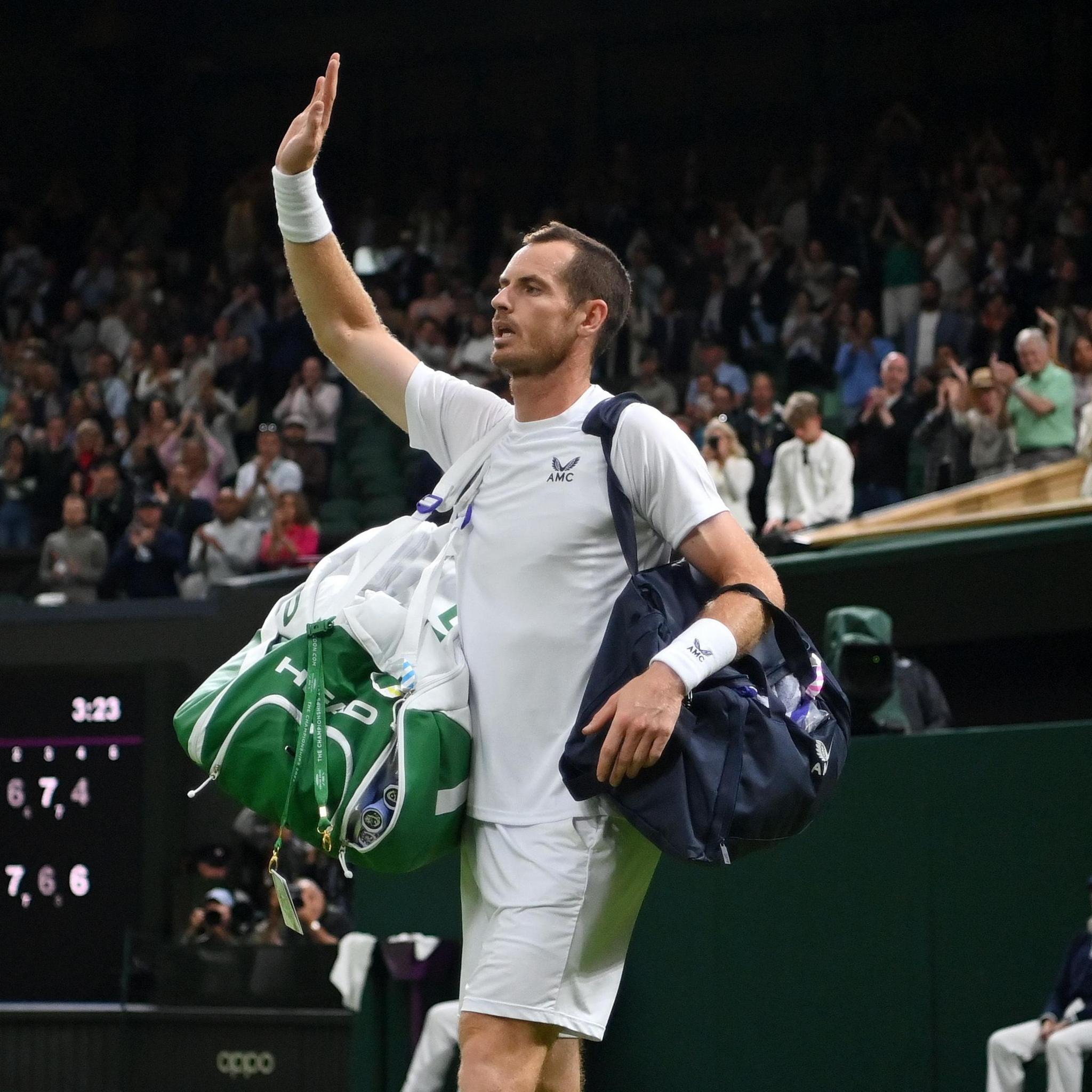
From 15 Wimbledon campaigns, Murray has won two singles titles. He has two Olympic singles golds after defending his London 2012 title in Rio de Janeiro four years later
Previously on Insight
- Published26 June 2024
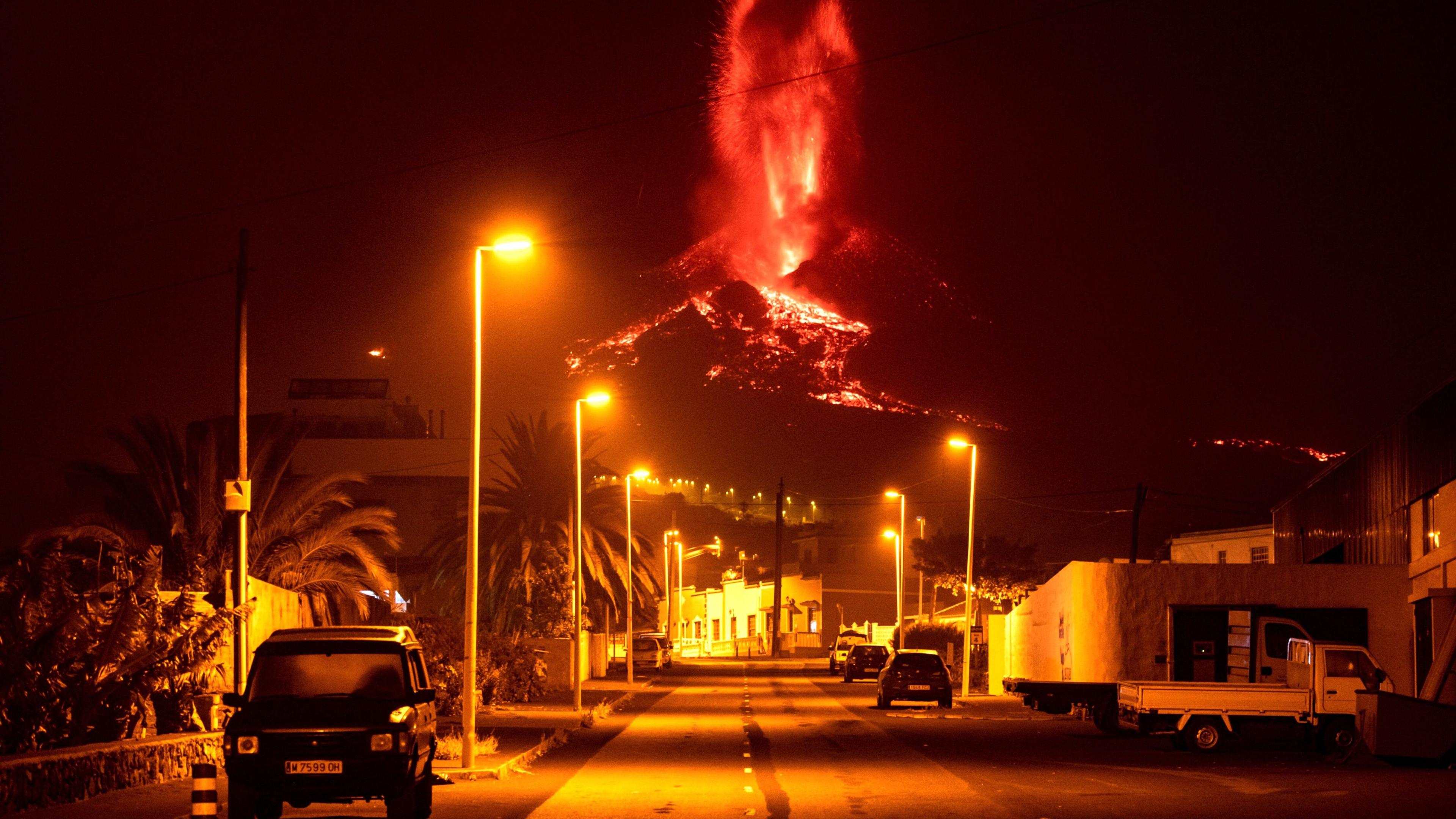
- Published20 June 2024
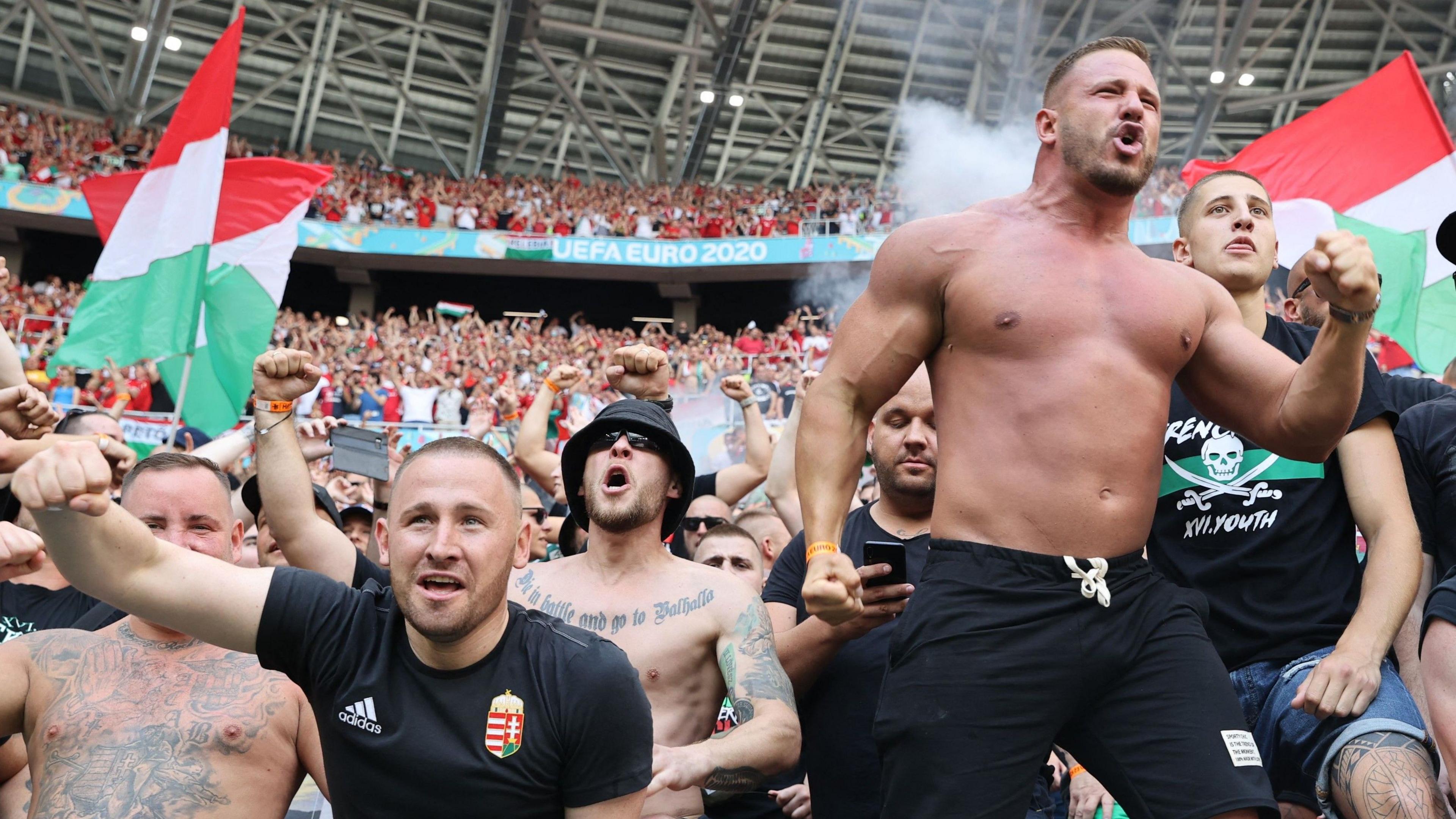
- Published20 June 2024
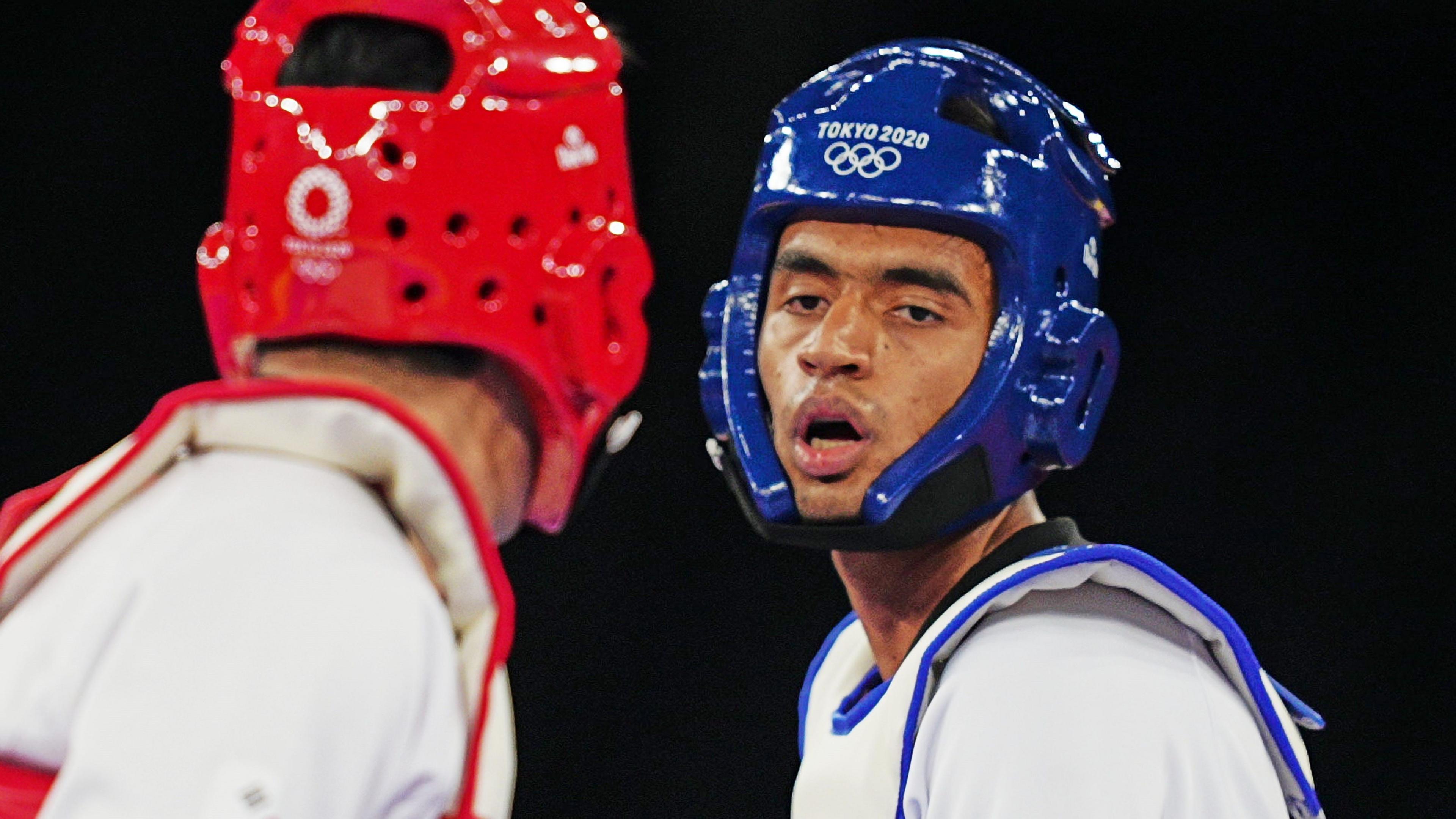
- Published28 May 2024
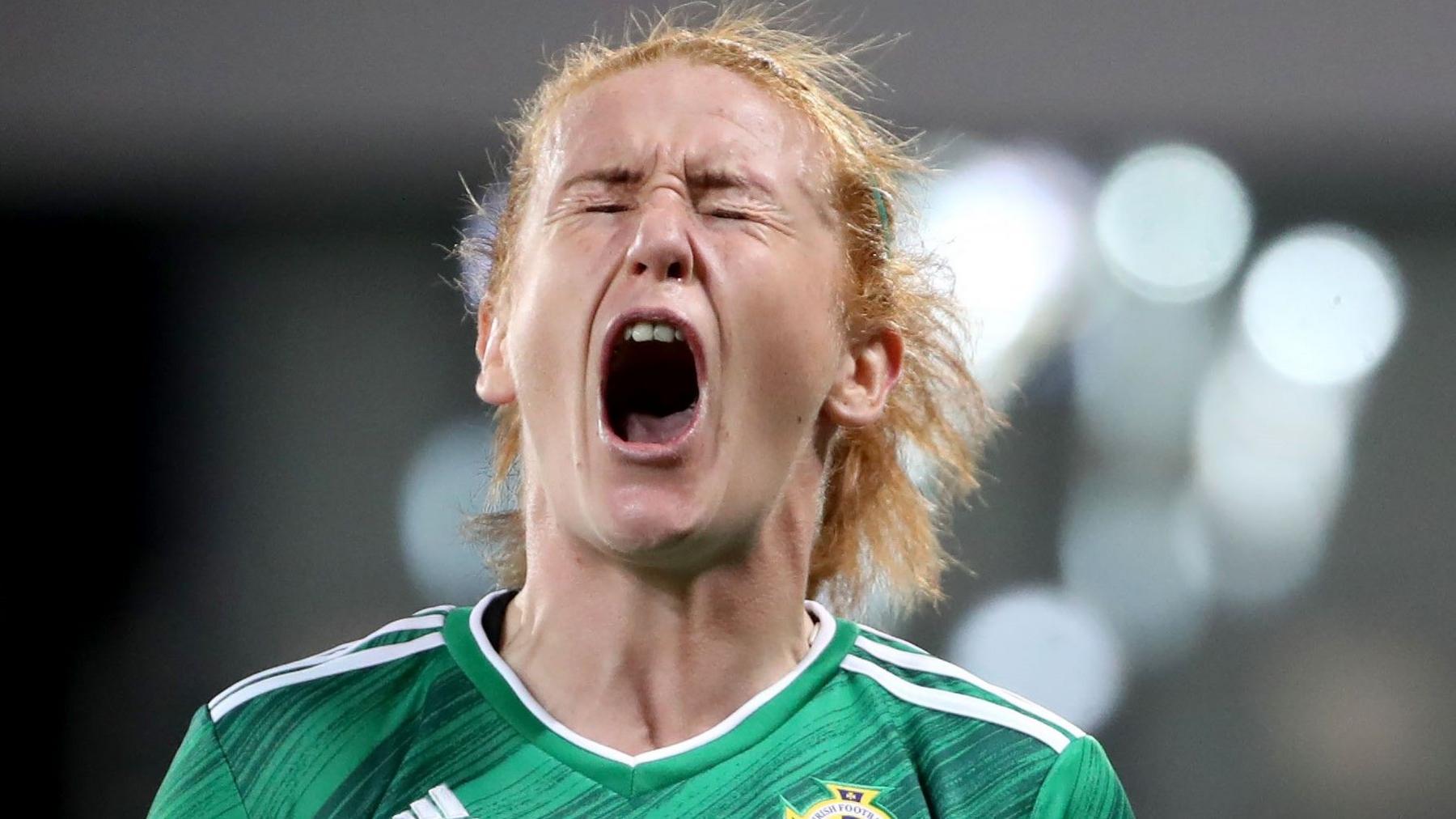
- Published23 May 2024
